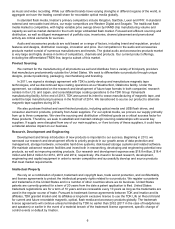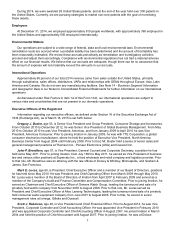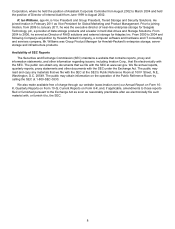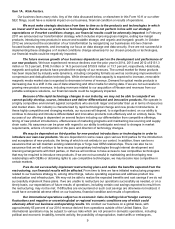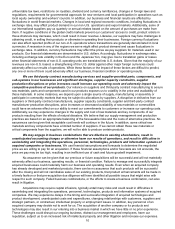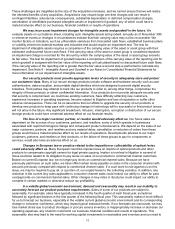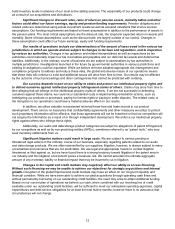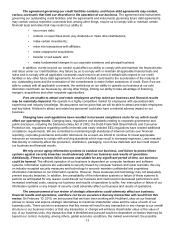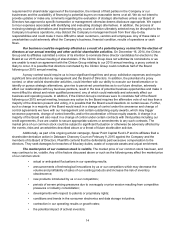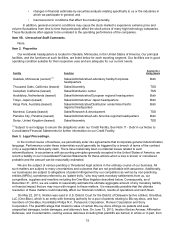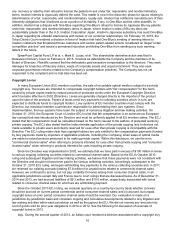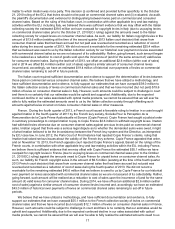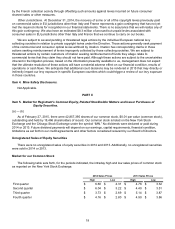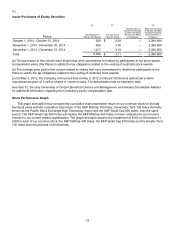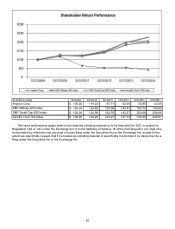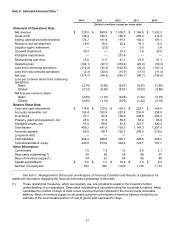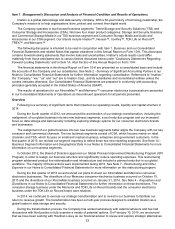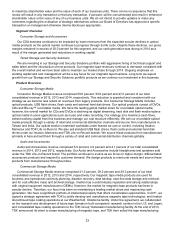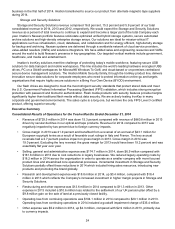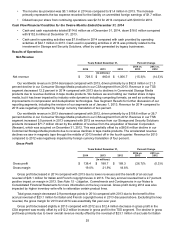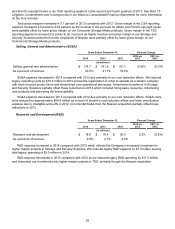Memorex 2014 Annual Report Download - page 21
Download and view the complete annual report
Please find page 21 of the 2014 Memorex annual report below. You can navigate through the pages in the report by either clicking on the pages listed below, or by using the keyword search tool below to find specific information within the annual report.16
any recovery or relief by their refusal to license the patents-in-suit under fair, reasonable, and nondiscriminatory
terms. Imation intends to vigorously defend the case. This matter is now in the discovery phase for issues relating to
determination of a fair, reasonable, and nondiscriminatory royalty rate. Imation has notified its manufacturers of their
indemnity obligations that it believes cover a portion of its liability, if any, to One-Blue and the other plaintiffs. In
addition, Imation has a dispute with One-Blue regarding One-Blue's refusal to license its Japanese Blu-ray patents
under fair, reasonable, and nondiscriminatory terms in Japan, where Imation’s sales of Blu-ray discs are
substantially greater than in the U.S. Imation Corporation Japan, Imation's Japanese subsidiary, has sued One-Blue
in Japan regarding its unlawful interference with certain of our customer relationships. On February 18, 2015, the
Tokyo District Court rendered a decision in favor of Imation that held One-Blue's sending of warning letters to
Imation customers that threatened those customers with certain patent-related actions constituted an illegal "unfair
competition practice" and issued a permanent injunction prohibiting One-Blue from sending any such warning
letters in the future.
SpearPoint Capital Fund LP et al. v. Mark E. Lucas, et al. This shareholder derivative action was filed in
Delaware Chancery Court on February 9, 2015. It names as defendants the Company and the members of its
Board of Directors. Plaintiffs contend that the defendants paid excessive compensation to the directors. They seek
damages for breaches of fiduciary duties, waste of corporate assets and unjust enrichment. They also seek
corporate governance reforms related to the Company’s compensation practices. The Company has not yet
responded to the complaint and no trial date has been set.
Copyright Levies
In many European Union (EU) member countries, the sale of recordable optical media is subject to a private
copyright levy. The levies are intended to compensate copyright holders with "fair compensation" for the harm
caused by private copies made by natural persons of protected works under the European Copyright Directive,
which became effective in 2002 (Directive). Levies are generally charged directly to the importer of the product
upon the sale of the products. Payers of levies remit levy payments to collecting societies which, in turn, are
expected to distribute funds to copyright holders. Levy systems of EU member countries must comply with the
Directive, but individual member countries are responsible for administering their own systems. Since
implementation, the levy systems have been the subject of numerous litigation and law making activities. On
October 21, 2010, the European Court of Justice (ECJ) ruled that fair compensation is an autonomous European
law concept that was introduced by the Directive and must be uniformly applied in all EU member states. The ECJ
stated that fair compensation must be calculated based on the harm caused to the authors of protected works by
private copying. The ECJ also stated that the indiscriminate application of the private copying levy to devices not
made available to private users and clearly reserved for uses other than private copying is incompatible with the
Directive. The ECJ ruling made clear that copyright holders are only entitled to fair compensation payments (funded
by levy payments made by importers of applicable products, including the Company) when sales of optical media
are made to natural persons presumed to be making private copies. Within this disclosure, we use the term
"commercial channel sales" when referring to products intended for uses other than private copying and "consumer
channel sales" when referring to products intended for uses including private copying.
Since the Directive was implemented in 2002, we estimate that we have paid in excess of $100 million in levies
to various ongoing collecting societies related to commercial channel sales. Based on the ECJ's October 2010
ruling and subsequent litigation and law making activities, we believe that these payments were not consistent with
the Directive and should not have been paid to the various collecting societies. Accordingly, subsequent to the
October 21, 2010 ECJ ruling, we began withholding levy payments to the various collecting societies and, in 2011,
we reversed our existing accruals (totaling $7.8 million) for unpaid levies related to commercial channel sales.
However, we continued to accrue, but not pay, a liability for levies arising from consumer channel sales, in all
applicable jurisdictions except Italy and France due to court rulings that are discussed below. As of December 31,
2014 and 2013, we had accrued liabilities of $9.3 million and $10.0 million, respectively, associated with levies
related to consumer channel sales for which we are withholding payment.
Since the October 2010 ECJ ruling, we evaluate quarterly on a country-by-country basis whether (i) levies
should be accrued on current period commercial and/or consumer channel sales; and (ii) accrued, but unpaid,
copyright levies on prior period consumer channel sales should be reversed. Our evaluation is made on a
jurisdiction-by-jurisdiction basis and considers ongoing and cumulative developments related to levy litigation and
law making activities within each jurisdiction as well as throughout the EU. We did not reverse any amounts into
cost of goods sold for prior year obligations in 2014 or 2012. See the following for discussion of reversals of
copyright levies in 2013.
Italy. During the second quarter of 2013, an Italian court rendered a decision associated with a copyright levy


